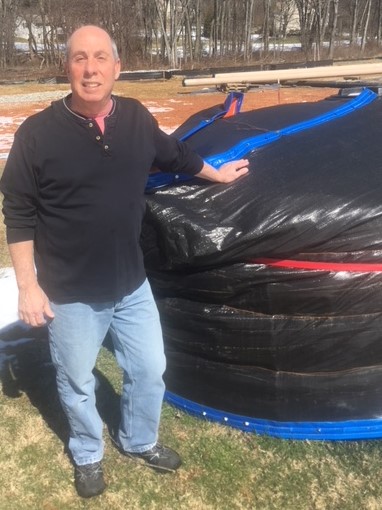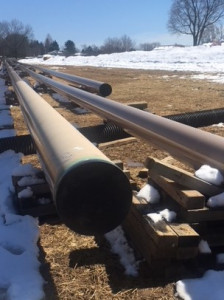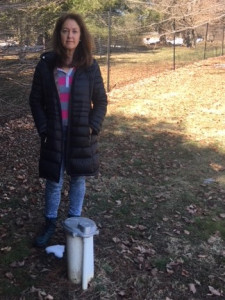On pipeline route, some well owners OK with Sunoco’s water; others are wary
-
Jon Hurdle

Bob Hoffman of Edgmont Township, Delaware County, says he's OK with a water 'buffalo' that Sunoco installed outside his home. It's to ensure a supply of clean water in case his private well is disrupted by drilling for the Mariner East pipelines.
A field outside Bob and Deborah Hoffman’s Delaware County home is filled with orange construction fencing, a 20-foot industrial curtain blocking their view of some surrounding houses, and hundreds of yards of steel pipeline waiting to be laid as part of the controversial Mariner East project.
On the lawn about 50 yards from their front door is a squat black tub known as a water buffalo, from which the Hoffmans get their water while the pipeline company, Sunoco, prepares to drill an underground bore where the pipe will be installed.
The temporary water supply is being provided to the Hoffmans and other owners of private water wells along the pipeline route because of concerns that their water could turn cloudy or become contaminated as the company drills a path through the local aquifer.
That happened last summer in Chester County’s West Whiteland Township, where some private water supplies turned cloudy after Sunoco punctured an aquifer during horizontal directional drilling for the pipeline.
That incident, and others like it along the cross-state pipeline route, led to a court agreement last summer requiring Sunoco to offer temporary water supplies to owners of private wells within 450 feet of a planned drilling operation. Many affected homeowners in West Whiteland were connected to public water instead, at Sunoco’s expense.
In Delaware County, the Hoffmans aren’t thrilled by having the black plastic tank on their lawn, but they have no complaints about the quality of the water, which they use for drinking, cooking, bathing and laundry. The couple agreed to compensation from Sunoco, which took about a quarter-acre of their land for construction.
“When they started the horizontal drilling process, they gave you the option of whether you wanted to use potable water since they would be coming within 100 feet of the well, and I thought: ‘Sure, why not?’” Bob Hoffman said.
His well has been disconnected and reconnected several times as Sunoco’s drilling schedule has changed, and is due to go back on line this week until the nearest stretch of pipeline bore is drilled until June.

Pipelines for the Mariner East project are poised outside Bob Hoffman's home in Edgmont Township, Delaware County.
Bob Hoffman, 61, an electrical engineer, said he is “a little annoyed” by all the changes, but is satisfied with Sunoco’s water deliveries three or four times a week, and said company representatives have always answered his questions. He said his well water has been tested several times by a Sunoco lab, and as far as he knows, there’s no sign of a decline in water quality since the pipeline construction began. But he acknowledged that the voluminous testing reports are hard to understand – “and I’m an engineer.”
Lasting effects of construction
Even though the water buffalo will be removed along with all of the industrial infrastructure when the pipeline is completed, Bob Hoffman accepts that the home where he has lived for 25 years will suffer some permanent loss of value because a pipeline will run nearby.
“Some potential buyers would say they are not even going to consider that property because there’s a pipeline there,” he said.
Sunoco has acknowledged the risk to both private and public water supplies during pipeline construction.
“Private and public water supplies may be impacted by hazardous material spills during any of the project activities including, open trenching, HDD and auger bore installation, and block valve and pump station construction and installation, and hydrostatic testing,” the company said in a report first submitted to the Department of Environmental Protection in 2016, and revised in August 2017 after the court-ordered settlement agreement.
Water supplies might also be affected by the drilling fluids used in HDD, the report said. In fact, there were dozens of drilling fluid spills along the line during 2017, leading the DEP to issue multiple notices of violation, and in January this year, to halt all construction for about a month because of what it called Sunoco’s “egregious” practices.
Construction resumed in February after DEP fined Sunoco $12.6 million for its violations. Despite the hiatus, the company says the line will be operational by the end of June.
Sunoco spokesman Jeff Shields said he didn’t know how many buffaloes have been offered or accepted along the 350-mile pipeline route.
“This is simply a courtesy extended to landowners who may be concerned about impacts to their wells. The alternate water supply would be available as long as a drill is running,” he said.
Well-water fears
In West Cornwall Township, Lebanon County, at least one resident has received Sunoco’s letter offering a temporary water supply during drilling, said resident Pam Bishop, who opposes the Mariner East project.
Despite the legal requirement for Sunoco to provide alternative water supplies to private well owners during drilling, some residents don’t want the temporary water tanks in their yards, distrust the quality of the water that they would contain, and see the provision of buffaloes as a tacit admission by Sunoco that private wells will be damaged.

Rosemary Fuller, of Media, stands next to the private water well that she fears will be contaminated when Sunoco drills for the Mariner East pipelines.
Rosemary Fuller, who lives in Media Township about three miles from the Hoffmans, draws her water from a private well that’s about 150 feet from where the drilling would take place on the edge of the property where she has lived since 2003. She says the well has always provided her with clean, plentiful and free water, and fears that it is now threatened by Sunoco’s plans.
“A lot of well owners like ourselves have had disturbances with their wells,” she said as she stood outside her home next to a white plastic pipe that marked the entrance to the well. “The level of the water has gone down, the quality of the water has become muddy – it has sediment in it.
“It’s contaminated. Whether it’s poisonous or not, it’s still contaminated, and that contamination is then passed to our equipment downstairs that purifies the water coming from the well, and if it’s dirty water, it puts a great deal of strain on that equipment,” she said.
Fuller, 58, agreed to an easement for the drilling along the edge of her property because she accepted the agent’s assurances that the pipe would have no impact on the land, would be underground, and would be carrying inert gases.
Now, she believes her safety is threatened by the explosive natural gas liquids that will be carried by the line, and that her water supply will be permanently damaged. Fuller said she does not want the water buffalo and is considering getting connected to a public water system, although that would be at her own, not Sunoco’s, expense.
She said she offered to pay back the compensation from Sunoco for the easement on her land, but has not had a response.
“We don’t know what we’re facing,” she said. “If I knew what we were dealing with, I could come to terms with it.”
In nearby Glen Mills, resident Michael Doyle lives about 100 yards from the pipeline right of way where construction activity is shielded from his and his neighbor’s property by a 20-foot-high industrial curtain suspended from steel poles.
Doyle, 36, a school teacher, isn’t overjoyed to feel drilling vibrations in the house where he lives with his wife and six children, and he would rather not live with the constant truck traffic at the end of his driveway, but his water hasn’t been affected, according to tests, and none of the construction is taking place on his land.
He acknowledged that some people are implacably opposed to the project, and some have moved away because they don’t want their children attending a school that’s a few hundred yards from the pipeline route. But he noted that the community has lived with an existing pipeline – Mariner East 1 – on the same route since the 1930s, and he predicted that opposition will fade away when construction is finished.
“We just want it to be done,” he said. “I honestly think that people are going to forget about it in a couple of years.”
















